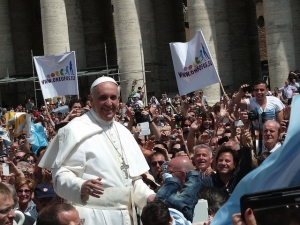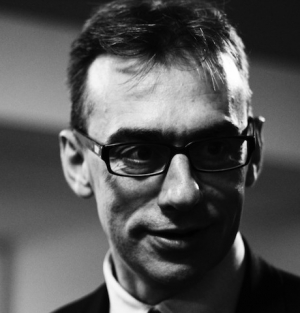Afficher les éléments par tag : Pope
A groovy kind of catholicism: Jorge Mario Bergoglio in the Vatican, between substance and style
On February 11, 2013, Joseph Aloisius Ratzinger, in a near unprecedented move that took his audience and the world largely by surprise, announced that he would abdicate as pope Benedict XVI. Speculation as to who was to become the successor to the one that would henceforth be known as pope ‘emeritus’ immediately started, until on March 13, an Argentinian cardinal of Italian descent, Jorge Mario Bergoglio, archbishop of Buenos Aires, was elected as pope Francis, to the surprise of many. Whereas the image of his predecessor was that of a stern and rather timid theologian, this can hardly be said of papa Bergoglio, who from his very accession has been heralded a renovator and a ‘modern’ pope, in many ways the opposite of his decidedly conservative, yet at the same time ‘postmodern’ predecessor. Two years have passed. To many, they have been years of revivification and progress. However, it can also be argued that there has been above all a change in tone and style, rather than in substance. As always, veritas in medio stat.
Informations supplémentaires
- Auteur Jan Nelis
Benedict XVI: The Post-Modern Pope
This truly post-modern pontificate could not have finished on a more coherent note, with Benedict XVI announcing resignation on 11 February 2013, only two months after his decision to join twitter. In the last decades, the age of spectacular contradictions and narcissistic stars, of nostalgic purists and charismatic visionaries, of gentle wolves and bullying lambs, has dramatically challenged the Papacy.
Joseph Ratzinger has relied on the unbending and invariable faith of the Church to face the storm: doctrinal solidity has been his asset first as an emerging theologian and bishop, then, from 1981 to 2005, as the relentless defensor fidei in his capacity as the Prefect of the Congregation for the Doctrine of the Faith; and finally, as Pope Benedict XVI, the re-evangelizer of Europe in the name of faith and reason. Since his early years, back to basics was Joseph Ratzinger’s recipe, against the background of a world, and a Church, going crazily secular. Good theology teaches that human failures are the inevitable consequence of the original sin; without Christ, and his Church, they cannot be endured, indeed they have no sense.
Informations supplémentaires
- Auteur Marco Ventura







 MangoGem
MangoGem